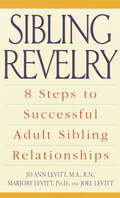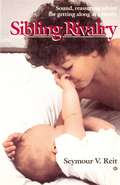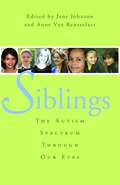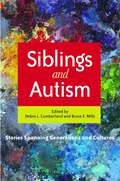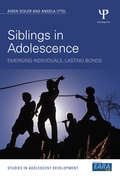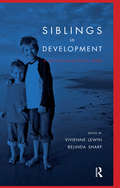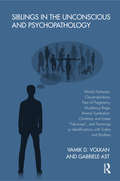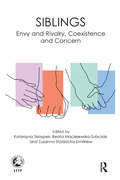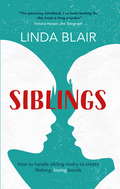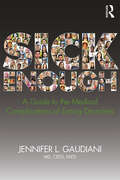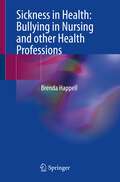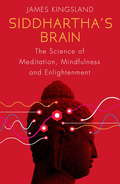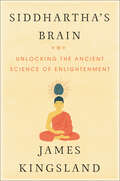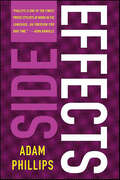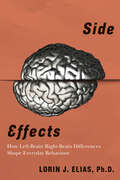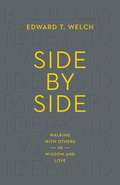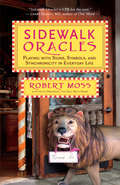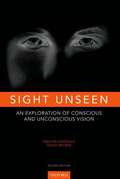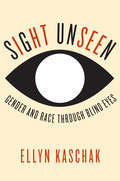- Table View
- List View
Sibling Revelry
by Marjory Levitt Joann LevittExperience the miracle of healing with a unique step-by-step program for enhancing adult sibling relationships -- created by siblings for siblingsMuch has been written about the relationships of parents and children. But the unsung chord in all of our adult relationships, professional and personal, is rooted in the sibling connection. In this extraordinary book based on their Sibling Revelry workshops, authors -- and siblings -- Jo Ann, Marjory, and Joel Levitt re-create the seminars that have helped many strengthen the bonds of their adult sibling relationships. In eight clearly focused steps, with added material for home study, the authors show how to transform sibling rivalry into extraordinary, nurturing adult bonds that will enhance all other relationships in your life. Now you can regain the closeness you and your siblings once shared, heal old wounds, and pave the way to a happier, healthier future. Learn how to:* Define your relationship -- Unload the myths of your shared past...and discover who you are to each other now* Witness the effect of old rivalries -- And use them as a springboard to great adult relationships* Envision a new future -- Break the habits that hold your relationship firmly in place...and create a powerful new vision for yourself and your family* Explore new modes of contact -- Examine the "role" you play in your family and free yourself from damaging old patterns* Heal wounds and misunderstandings -- Resolve old conflicts as you sort through old issues of fear, anger, guilt, and hurt* Invent new family legends -- Uncover the myths and legends that have shaped your relationship...then create new ones* Make room for differences -- Clear out "sibling clutter" and accept your siblings exactly as they are* Honor your strengths -- Celebrate the positive qualities each sibling brings to the relationship...and set the stage for a lifelong connectionFrom the Trade Paperback edition.
Sibling Rivalry: Sound, Reassuring Advice for Getting Along as a Family
by Seymour V. ReitWritten in the warm and reassuring Bank Street style, this is an authoritative, ground-breaking guide entriely devoted to the dilemmas of sibling rivalry. Issues such as jealousy, sharing and fighting between siblings are discussed, and there are special sections on twins, step-siblings and single parents.
Siblings
by Jane Johnson Anne Van RensselaerGrowing up with a sibling on the autistic spectrum can be difficult, and the needs of a child with autism often overwhelm a family, leaving neurotypical children feeling overshadowed. For the first time, the 'neurotypical' siblings get to have their say. They recount the good, the bad, and the downright annoying in a way that all young people in a similar situation will immediately recognise. Young siblings of all ages candidly recount how being 'the neurotypical one' can be tiring, frustrating, and lonely, but equally rewarding, and every story is injected with wisdom gained by young people who often have to grow up a lot more quickly than their peers. This book is essential reading for children and teenagers with a sibling on the autistic spectrum, and for parents wishing to understand how autism in the family will affect their neurotypical child.
Siblings and Autism
by Bruce Mills Debra CumberlandWhat is it like to grow up with a sibling on the autism spectrum? What kind of relationship do such siblings have? How does that relationship change as the siblings get older? In this moving collection of beautifully-written personal accounts, siblings from a variety of backgrounds, and in different circumstances, share their experiences of growing up with a brother or sister with autism. Despite their many differences, their stories show that certain things are common to the "sibling experience": the emotional terrain of looking on or being overlooked; the confusion of accommodating resentment, love, and helplessness; and the yearning to connect across neurological difference. Siblings and Autism is a thought-provoking book that will appeal to anyone with a personal or professional interest in autism, including parents of siblings of children on the spectrum, teachers, counsellors, and psychologists.
Siblings in Adolescence: Emerging individuals, lasting bonds (Studies in Adolescent Development)
by Angela Ittel Aiden SislerHow do brothers and sisters shape one another? Siblings in Adolescence provides a comprehensive overview of the most up-to-date, international empirical research on the sibling bond during the critical adolescent years. The authors examine how the relationship impacts on adolescent development, as well as the effect on and within the family, using evidence from behaviour genetics, cross-cultural studies, and research utilizing both quantitative and qualitative methods. The book presents a multi-faceted dynamic view of the adolescent sibling relationship, drawing on perspectives from sociological, psychological, and ecological and systems science. It introduces a novel theoretical perspective which covers sibling dynamics across various key environments such as their families, communities, and cultures. Parents and siblings will also find useful coverage of the following issues: school and life transitions parental separation health, illness, and disability diverse family experiences. Siblings in Adolescence will be indispensable for advanced undergraduate and postgraduate students studying human development, and will supplement postgraduate courses for teachers, counsellors, and social, youth, and health workers. It will also be required reading for all those who work and do research with families and young people.
Siblings in Development: A Psychoanalytic View
by Vivienne Lewin Belinda SharpSiblings play an integral and essential part in our psychic development. Traditionally in psychoanalytic thinking, sibling relationships are regarded as secondary in developmental importance to the relationships with the parents. The authors in this book challenge this view and explore the impact of sibling relationships on internal psychic structures, family and social relationships. They suggest that siblings play a primary part in psychic development, even for an only child, and that infants are born with an expectation of siblings, an innate pre-conception similar to those relating to the breast and parental couple. Through infant observations and psychoanalytic treatment, the authors in this book examine sibling relationships from the most profoundly close, as in conjoined twins, through other twin and sibling relationships and deliberate on the wider context of social and tribal brotherhood and sisterhood.
Siblings in the Unconscious and Psychopathology: Womb Fantasies, Claustrophobias, Fear of Pregnancy, Murderous Rage, Animal Symbolism, Christmas and Easter "Neuroses", and Twinnings or Identifications with Sisters and Brothers
by Vamik D. Volkan Gabriele AstThis book examines adults' identifications and internal relationships with their siblings' mental representations. The authors believe that the best way to illustrate clinical formulations and psychoanalytic theoretical concepts is to provide detailed clinical data. The influence of childhood sibling experiences and associated unconscious fantasies, in their own right, in adults' personality characteristics, behaviour patterns, and symptoms are presented from seventeen case reports. Clinicians who have patients with fear of pregnancy, claustrophobia, incestuous fantasies, extreme dependency on or murderous rage against siblings, guilt due to the death of a sister or brother in childhood, replacement child syndrome, history of adoption, certain types of animal phobias and related issues will find this volume most helpful. The authors have made a rare, but needed, psychoanalytic contribution that examines mental representations of sisters and brothers in our daily lives.
Siblings: Envy and Rivalry, Coexistence and Concern (The\efpp Monograph Ser.)
by Katarzyna Skrzypek Beata Maciejewska-Sobczak Zuzanna Stadnicka-DmitriewThis book compiles papers presented at the European Federation of Psychoanalytic Psychotherapy's 2011 Conference, which attempts to find the place of sibling relationships in psychoanalytic practice. It examines the rivalry and envy between siblings, and the coexistence and concern for each other.
Siblings: How to handle sibling rivalry to create strong and loving bonds
by Linda BlairSiblings - your guide to positive parenting and how to handle sibling rivalry and jealousy. Here is the essential parenting book which will guide you to calmer, easier, happier parenting and help you raise siblings without rivalry.Clinical psychologist Linda Blair takes a positive approach to this subject - instead of trying to eliminate the natural rivalry that occurs or striving for an unrealistic idyll of a calm, non-confrontational household, she teaches parents how to use sibling interactions to build emotional intelligence and good social skills. Through a framework of core principles, Linda guides you through potential issues towards parenting without power struggles and raising happy children. Find out how to:Manage the powerful effect of the age gap and birth orderDeal with disagreements and stop argumentsAlleviate competition and jealousyEncourage communication and cooperationHow to introduce step-siblingsSet your children up for strong, lifelong relationshipsSiblings turns sibling rivalry on its head offering parents a practical positive approach to bringing up children and teenagers and understanding the relationships into adulthood. This essential guide to positive parenting will show you how to handle sibling rivalry to create lifelong loving bonds. 'The parenting handbook I've been looking for - this book is long overdue'Victoria Harper, The Telegraph 'I love this book. It's essential reading for siblings and for anyone who has to deal with siblings.'Cathy Rentzenbrink, The Last Act of Love
Siblings: How to handle sibling rivalry to create strong and loving bonds
by Linda BlairSiblings - your guide to positive parenting and how to handle sibling rivalry and jealousy. Here is the essential parenting book which will guide you to calmer, easier, happier parenting and help you raise siblings without rivalry.Clinical psychologist Linda Blair takes a positive approach to this subject - instead of trying to eliminate the natural rivalry that occurs or striving for an unrealistic idyll of a calm, non-confrontational household, she teaches parents how to use sibling interactions to build emotional intelligence and good social skills. Through a framework of core principles, Linda guides you through potential issues towards parenting without power struggles and raising happy children. Find out how to:Manage the powerful effect of the age gap and birth orderDeal with disagreements and stop argumentsAlleviate competition and jealousyEncourage communication and cooperationHow to introduce step-siblingsSet your children up for strong, lifelong relationshipsSiblings turns sibling rivalry on its head offering parents a practical positive approach to bringing up children and teenagers and understanding the relationships into adulthood. This essential guide to positive parenting will show you how to handle sibling rivalry to create lifelong loving bonds. 'The parenting handbook I've been looking for - this book is long overdue'Victoria Harper, The Telegraph 'I love this book. It's essential reading for siblings and for anyone who has to deal with siblings.'Cathy Rentzenbrink, The Last Act of Love
Sich besser präsentieren: Wirkungsvolle Kommunikation für Wissenschaftler*innen
by Regina Maria JankowitschDrittmittelakquisition, Berufungen, Vorträge, Interviews & Co: Die Leser*innen erhalten eine praxisnahe Gebrauchsanleitung, wie sie konkrete kommunikative Herausforderungen ihres beruflichen Alltags effizienter, professioneller und effektiver bewältigen können. Rasch auf den Punkt zu kommen, sich einfach und doch präzise ausdrücken zu können und sich selbst bzw. wissenschaftliche Projekte besser positionieren bzw. verkaufen zu können – damit sind Wissenschaftler*innen aller Fachrichtungen und aller Karrierestufen innerhalb wie außerhalb der Universitäten aktuell ständig konfrontiert. Corona hat deutlich gemacht, was sich schon länger gezeigt hat: Fachwissen allein ist zu wenig.Dieses Buch ist ein praxisnaher Leitfaden für alle, die vor Fördermittelgebern und Kooperationspartnern, bei wissenschaftlichen Hearings, vor Laien-Publikum und in den Medien punkten wollen.
Sicher anlegen statt sparen: Vermögen aufbauen und mehrfach verdoppeln
by Werner StubenrauchDer Zinseszinseffekt, das „Grundgesetz der Geldvermehrung“, wird in seiner Wirkung enorm unterschätzt. Vielen Geldanlegern ist nicht bekannt, dass sich damit eine regelmäßige Verdopplung der Ersparnisse erreichen lässt. Auf diese Weise kann man eine solide private Altersvorsorge oder ein Vermögen aufbauen, auch in Zeiten von Inflation und Rezession. Entscheidend ist die Wahl geeigneter Geldanlagen. Längst nicht alles, was Banken und Versicherungen anbieten, ist sicher und ertragreich. Viele Angebote eignen sich nur zum kurzfristigen „Geldparken“, andere sind so hochspekulativ, dass solide denkende Anleger sie meiden sollten. Der Autor weist in diesem Buch den Weg durch den Dschungel der zahlreichen Angebote von Finanzinstituten. Anhand von Beispielen rechnet er nach und vergleicht, welche Produkte empfehlenswert sind; dabei berücksichtigt er auch Steuern und Inflation. Besonders lohnend sind gemanagte Aktienfonds. Holen Sie das Maximum aus Ihrem Geld heraus, indem Sieden Zusammenhang von Zeit, Zinshöhe, Zinzeszins und langfristigem, sicherem Ertrag verstehen und nutzen.
Sicher in unsicheren Zeiten
by Ruth EnzlerWege zu einem stabilen Selbst. Ein Ratgeber mit Erkenntnissen aus Neurowissenschaften & Persönlichkeitspsychologie und mit Achtsamkeitsübungen Dieses Buch geht uns alle an, weil es zentrale Punkte des aktuellen Zeitgeschehens der Coronapandemie aufgreift und uns Wege aufzeigt, wie wir mit Umbrüchen, Nichtplanbarem und Unsicherheiten umgehen können. Die Hauptfragen sind: Wie bleiben wir trotz äußeren Unsicherheiten innerlich stabil und psychisch gesund? Wie gehen wir mit den daraus entstehenden Ängsten um? Wie können wir in uns selbst einen soliden Boden schaffen, der einem Sturm standhält? Zahlreiche Fallbeispiele aus dem langjährigen Beratungsfundus von Ruth Enzler, einer promovierten Psychologin und Coach mit eigener Praxis in Zollikon bei Zürich, sind direkt anwendbar für unterschiedliche Persönlichkeitstypen. Darüber hinaus wird für den Leser und die Leserin die Spiritualität als Grundressource zur inneren Stabilisierung aufgrund psychodynamischer Methoden und mit Grundsätzen aus den Neurowissenschaften und der Quantenphysik erfahrbar. Praktische Übungsanleitungen und zusätzliche Achtsamkeitsmethoden dienen all jenen, die sich dem Leben neu öffnen und ihren Weg zum stabilen Selbst gehen wollen. Sie bekommen einen neuen Blick auf die Welt!
Sick Enough: A Guide to the Medical Complications of Eating Disorders
by Jennifer L. GaudianiPatients with eating disorders frequently feel that they aren’t "sick enough" to merit treatment, despite medical problems that are both measurable and unmeasurable. They may struggle to accept rest, nutrition, and a team to help them move towards recovery. Sick Enough offers patients, their families, and clinicians a comprehensive, accessible review of the medical issues that arise from eating disorders by bringing relatable case presentations and a scientifically sound, engaging style to the topic. Using metaphor and patient-centered language, Dr. Gaudiani aims to improve medical diagnosis and treatment, motivate recovery, and validate the lived experiences of individuals of all body shapes and sizes, while firmly rejecting dieting culture.
Sickness in Health: Bullying in Nursing and other Health Professions
by Brenda HappellThis book informs students and practitioners of the health professions about workplace bullying and how to recognise it. The health professions have among the highest rates of bullying of any occupational group. This book shines a light on bullying and its very real human consequences for health professionals. Statistics about bullying in health present a disturbing picture. However, they don't convey the human impact on people who only want to do good for others. The author begins by telling how her experiences spurred her to write this book and then introduces the champions, twelve health professionals who contributed their stories. The book starts with the champions' decision to become a health professional, and then describes their bullying experiences, the impact on almost every aspect of their lives and careers, and how they tried to resolve or deal with the bullying. Some were still dealing with bullying, and all felt they had been forever changed by their experiences.The stories show that bullying is much more than the actions of a few, it is deeply embedded in the culture of institutions responsible for providing quality health care. Better preparation for leadership positions and independent processes for reporting unacceptable behaviours and actions are two suggestions for tackling bullying and its consequences. This book shows the necessity to expose these appalling behaviours and their human costs in order to address workplace bullying and create a healthy and safe environment for everyone in healthcare. This volume is aimed at undergraduate and postgraduate students, and practitioners of nursing and other health professions, the general public and other stakeholders of health services. It will enhance their understanding of, ability to recognise, and strategies to cope with, workplace bullying.
Siddhartha's Brain: The Science of Meditation, Mindfulness and Enlightenment
by James KingslandWINNER OF THE GOLD PRIZE FOR RELIGION / SPIRITUALITY OF EASTERN THOUGHT AT THE 2016 NAUTILUS BOOK AWARDS.Can meditation and mindfulness exercise make us sharper, smarter, healthier, happier? In Siddhartha's Brain, James Kingsland reveals that a complete scientific theory of how these practices work is now within our grasp and may be the key to treating a wide range of afflictions of the human mind. Some twenty-five centuries ago, an Indian sage called Siddhartha Gautama - the man who would become known as the Buddha - developed a programme for improving mental well-being which has been passed down to us by generations of monks and nuns. Today, secular mindfulness courses are proving their worth for tackling many of the problems associated with the demands of our frenetic, technology-driven modern world.Research has shown that mindfulness can be used to treat stress, anxiety, depression, chronic pain, hypertension and drug addiction, as well as improving concentration, empathy, emotion regulation and the quality of interpersonal relationships. There have even been hints that it could enhance immune function, slow cellular ageing and help keep dementia at bay. Taking us on a journey back to the time of the Buddha to track changes in his brain as he travels the path leading to enlightenment, Siddhartha's Brain explains how meditation and mindfulness transform the human mind.
Siddhartha's Brain: Unlocking the Ancient Science of Enlightenment
by James KingslandGuardian science editor James Kingsland unlocks the ancient science of enlightenment through the journey of Siddhartha—better known as Buddha.In a lush grove on the banks of the Neranjara in northern India—400 years before the birth of Christ, when the foundations of western science and philosophy were being laid by the great minds of Ancient Greece—a prince turned ascetic wanderer sat beneath a fig tree. His name was Siddhartha Gautama, and he was discovering the astonishing capabilities of the human brain and the secrets of mental wellness and spiritual “enlightenment”—the foundation of Buddhism.Framed by the historical journey and teachings of the Buddha, Siddhartha’s Brain shows how meditative and Buddhist practice anticipated the findings of modern neuroscience. Moving from the evolutionary history of the brain to the disorders and neuroses associated with our technology-driven world, James Kingsland explains why the ancient practice of mindfulness has been so beneficial and so important for human beings across time. Far from a New Age fad, the principles of meditation have deep scientific support and have been proven to be effective in combating many contemporary psychiatric disorders. Siddhartha posited that “Our life is shaped by our mind; we become what we think.” As we are increasingly driven to distraction by competing demands, our ability to focus and control our thoughts has never been more challenged—or more vital.Siddhartha’s Brain offers a cutting-edge, big-picture assessment of meditation and mindfulness: how it works, what it does to our brains, and why meditative practice has never been more important.
Side Effects
by Adam PhillipsPsychoanalysis works by attending to the patient's side effects, "what falls out of his pockets once he starts speaking." Undergoing psychoanalytic therapy is always a leap into the dark—like dedicating our hearts and intellect to a powerful work of literature, it's impossible to know beforehand its ultimate effect and consequences. One must remain open to where the "side effects" will lead.Erudite, eloquent, and enthrallingly observant, Adam Phillips is one of the world's most respected psychoanalysts and a boldly original writer and thinker—and the ideal guide to exploring the provocative connections between psychoanalytic treatment and enduring, transformative literature. His fascinating and thoughtful Side Effects offers a valuable intellectual blueprint for the construction of a life beholden to no ideology other than the fulfillment of personal promise.
Side Effects: How Left-Brain Right-Brain Differences Shape Everyday Behaviour
by Lorin J. EliasUnderstanding how right-brain and left-brain differences influence our habits, thoughts, and actions.Human behaviour is lopsided. When cradling a newborn child, most of us cradle the infant to the left. When posing for a portrait, we tend to put our left cheek forward. When kissing a lover, we usually tilt our head to the right. Why is our behaviour so lopsided and what does this teach us about our brains? How have humans instinctively used this information to make our images more attractive and impactful? Can knowing how left-brain right-brain differences shape our opinions, tendencies, and attitudes help us make better choices in art, architecture, advertising, or even athletics? Side Effects delves into how lateral biases in our brains influence everyday behaviour and how being aware of these biases can be to our advantage.
Side by Side: Walking with Others in Wisdom and Love
by Edward T. WelchWritten by a prominent biblical counselor with three decades of experience, this practical book aimed at everyday Christians will equip readers with the tools they need to wisely walk alongside one another in the midst of life's struggles.
Sidewalk Oracles: Playing with Signs, Symbols, and Synchronicity in Everyday Life
by Robert MossSynchronicity is when the universe gets personal. Through this book of games and enchanting stories, you’ll learn how to monitor the play of coincidence and the symbolic resonance of incidents in daily life in order to tap into the deeper logic of events, receive extraordinary counsel, and have wonderful fun. You will be invited to become a kairomancer: someone who is poised to catch the messages in special moments when synchronicity is in play — and to take action to seize the opportunities those moments present. To be a kairomancer, you need to trust your feelings as you walk the roads of this world, to develop your personal science of shivers, and to recognize in your gut and your skin that you know far more than you hold on the surface of consciousness. This is a way of real magic, which is the art of bringing gifts from a deeper world into this one. Follow it, and you will put a champagne fizz of enchantment into your everyday life.
Siga em frente!
by Gabriel AgboUm dos maiores presentes que o Senhor nos dá é a capacidade de reconhecer quando esperar em uma posição específica ou circunstância, e quando avançar para a próxima fase do nosso destino. As escrituras sempre nos mostrarão que há um tempo certo para tudo. Há um tempo para permanecer e também um tempo para mudar. O tempo para ficar é quando Deus lhe diz especificamente para fazê-lo, ou quando você não tem muita certeza do que Ele quer que você faça. Mas, quando você ouve Dele ou está plenamente consciente de Sua vontade em uma situação específica, esse é o melhor momento para mudar e tomar posse do que Ele prometeu a você. Nosso sucesso na vida depende em grande parte desse princípio divino. Neste livro, você aprenderá muito sobre isso e mais.
Sight Unseen: An Exploration of Conscious and Unconscious Vision (Second Edition)
by David Milner Melvyn GoodaleIn this updated and extended edition of their book, Goodale and Milner explore one of the most extraordinary neurological cases of recent years-one that profoundly changed scientific views on the visual brain. Taking us on a journey into the unconscious brain, this book is a fascinating illustration of the power of the 'unconscious' mind.
Sight Unseen: Gender and Race Through Blind Eyes
by Ellyn KaschakSight Unseen reveals the cultural and biological realities of race, gender, and sexual orientation from the perspective of the blind. Through ten case studies and dozens of interviews, Ellyn Kaschak taps directly into the phenomenology of race, gender, and sexual orientation among blind individuals, along with the everyday epistemology of vision. Kaschak's work reveals not only how the blind create systems of meaning out of cultural norms but also how cultural norms inform our conscious and unconscious interactions with others regardless of our physical ability to see.
Sigmund Freud
by Robert BocockFirst Published in 2002. Routledge is an imprint of Taylor & Francis, an informa company.
